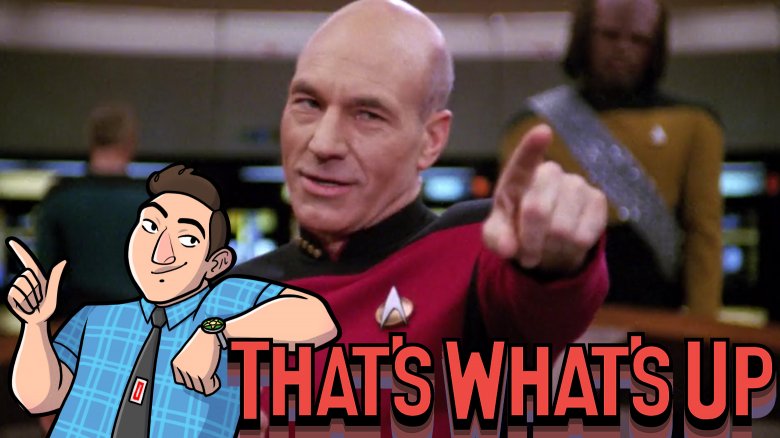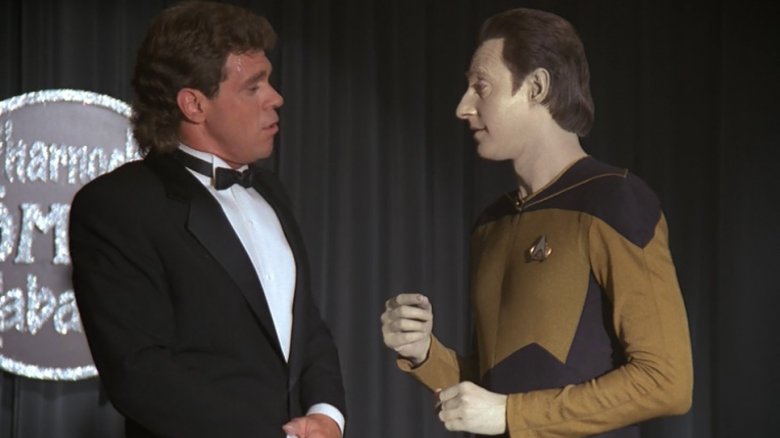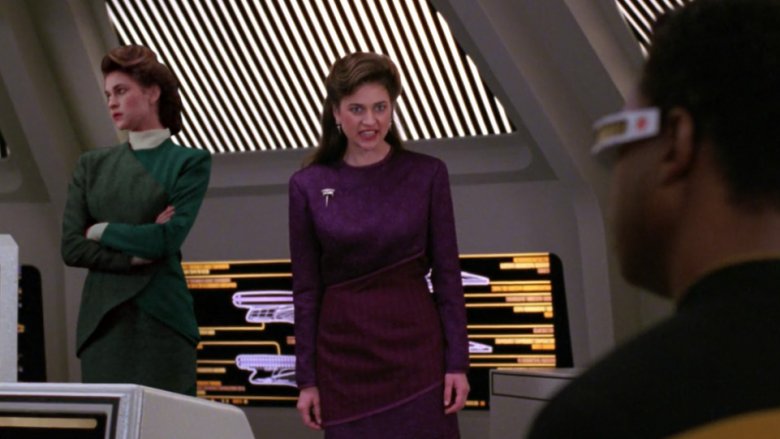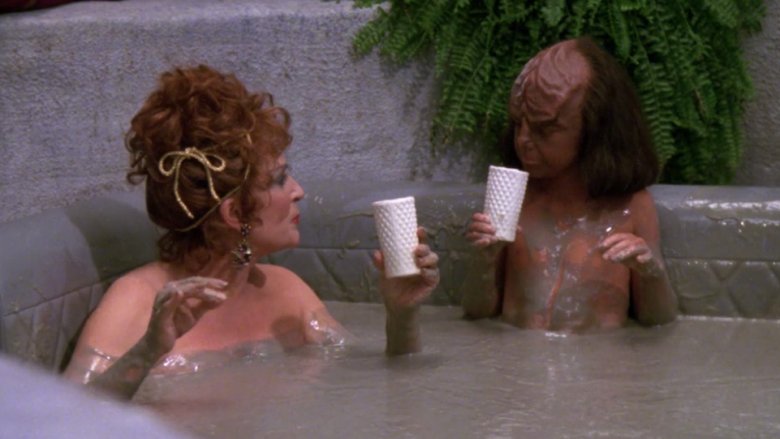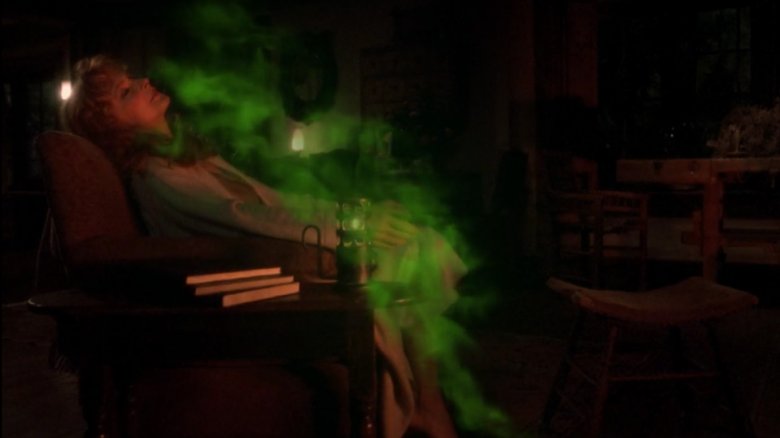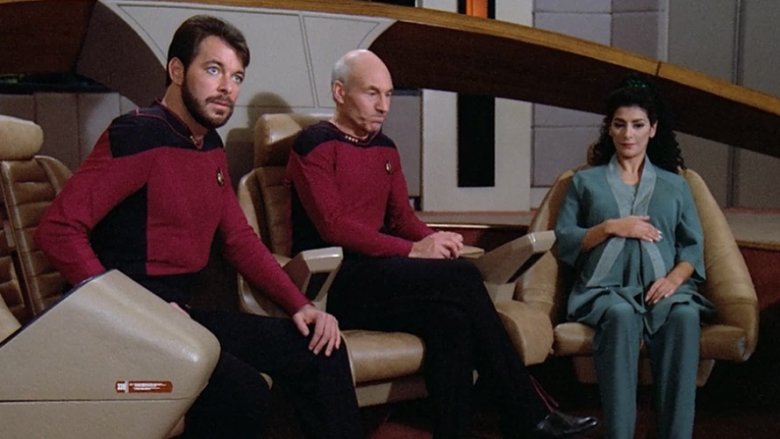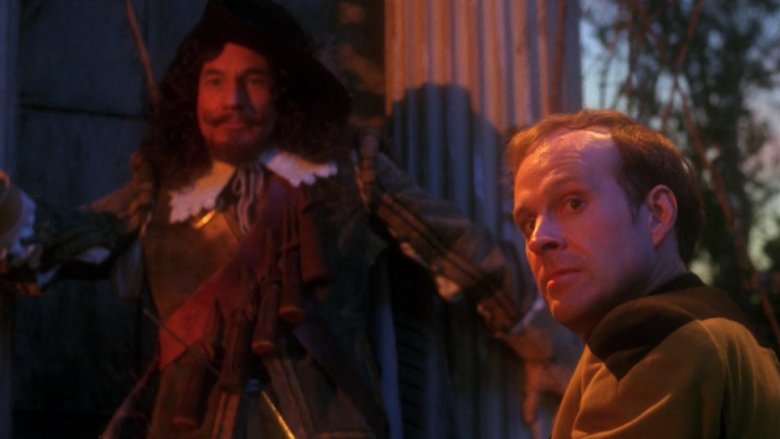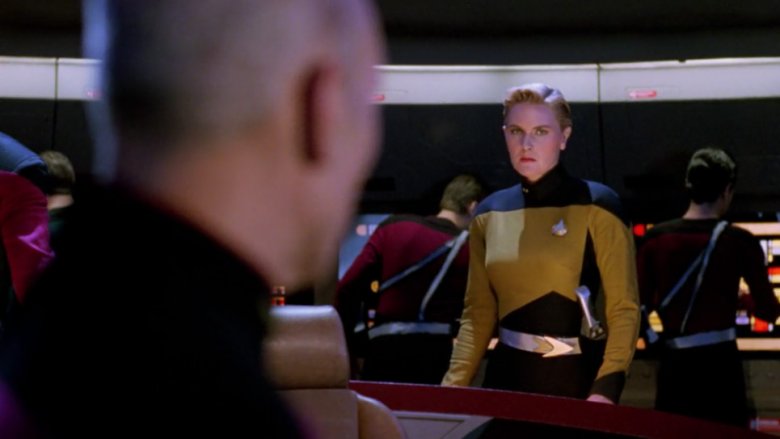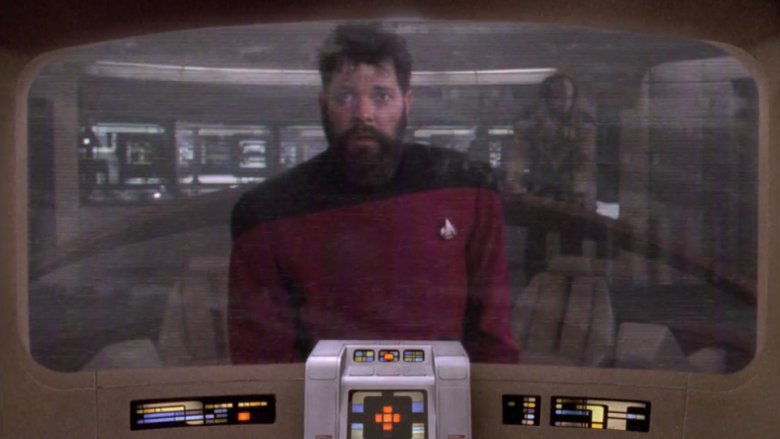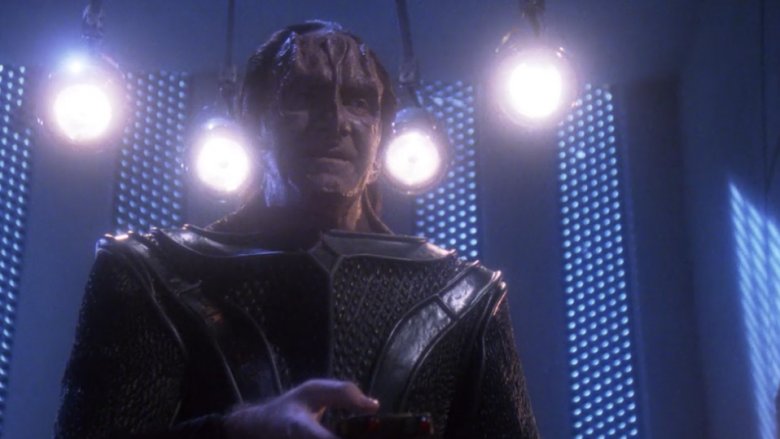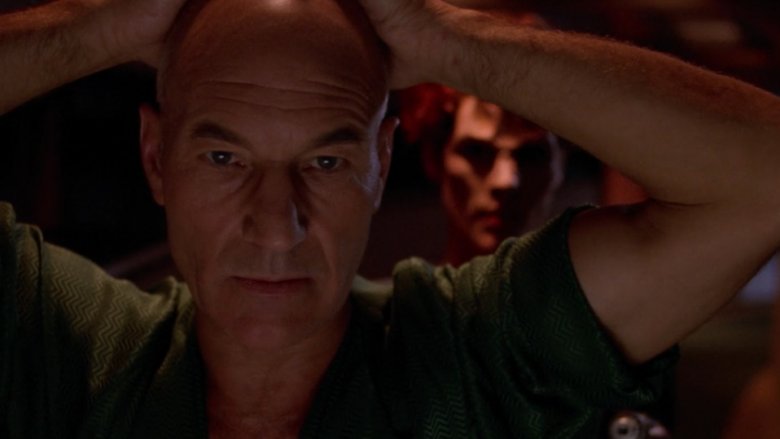That's What's Up: The 5 Best And 5 Worst Episodes Of Star Trek: The Next Generation
Each week, comic book writer Chris Sims answers the burning questions you have about the world of comics and pop culture: what's up with that? If you'd like to ask Chris a question, please send it to @theisb on Twitter with the hashtag #WhatsUpChris, or email it to staff@looper.com with the subject line "That's What's Up."
Q: Hey Chris, you're pretty into Star Trek: The Next Generation, right? If I want a crash course in it, what are the best episodes to watch, and which ones should I avoid? — via email
Hmm, let me see here. I definitely wore a toy communicator pin to school every day in fourth grade, and when I say "a toy," I don't mean a show-accurate replica pin that you could just wear like an accessory. I mean that bad boy that Playmates put out that was like an inch and a half thick with red LEDs under a silver sticker, which weighed about a pound and stretched my t-shirts out until they looked like one of Deanna Troi's asymmetrical scoop-neck dresses. So if that's what you mean by "pretty into it," then yes. I am pretty into TNG.
But while I consider it to be one of the most endlessly rewatchable television shows ever made, I'll admit that with 178 episodes spread over 7 seasons, there are some pretty rough ones in there — like, say, most of the first two seasons. Honestly, the best way to go about it might just be doing what one of my best friends does and only watching the ones that have Commander Riker in the thumbnail, but if you want specifics, I'm happy to provide you with the best and worst.
Worst #5: The Outrageous Okona (Season 2, Episode 4)
A thing that's important to keep in mind when you're talking about Star Trek: The Next Generation is that even when it's bad, it's usually still pretty charming. "The Naked Now," where the entire crew gets drunk and we find out that Data bangs — something that's so important that they established it in the second episode of the series — or "The Game," where Riker goes to a sex planet and brings back a video game that makes the crew have addictive VR orgasms? Those episodes are bad by any measure, but they're also fun to watch. "The Outrageous Okona," on the other hand, is a slog.
It's got two huge problems, and the first comes from the fact that they're trying to bring back an idea that worked on the original Star Trek. Okona, an allegedly charming Han Solo-esque rogue played by Bill Campbell — who you might remember from his starring role in The Rocketeer — is clearly Next Gen's attempt at recreating Harry Mudd. The thing is, while Mudd was a charmingly ridiculous, completely amoral swindler who stands in contrast to the heroes, Okona is just an aw-shucks good guy who happens to have a ponytail. He might actually be the least outrageous character on the show, but I suppose "the relentlessly bland Okona" didn't have that alliteration they wanted for the title.
The second problem comes from the B-plot, where Data attempts to learn how to be funny and fails on every conceivable letter. "Data wants to be human" episodes are pretty rough territory at the best of times, but the introduction of Joe Piscopo as a holographic avatar of comedy is among the most grating sights ever committed to film. To be fair, that's on purpose, but still.
Worst #4: Galaxy's Child (Season 4, Episode 16)
Okay, the first thing you need to know about this episode is that two years earlier, Geordi fell in love with an imaginary doctor on the holodeck.
The problem is that she wasn't entirely imaginary after all. Instead, she was based on Dr. Leah Brahms, the engineer who designed the Enterprise's warp drive system, and when the real Dr. Brahms showed up to help with a problem, Geordi slides into that working relationship like they're going to pick up right where he left off with his 24th century RealDoll. Needless to say, it doesn't work out, and Brahms spends most of the episode fending off Lieutenant Commander LaForge's inexplicably unprofessional advances until she finally discovers the program.
There actually is some interesting stuff in this episode — specifically the fact that the Enterprise, seemingly of its own volition, created a human form that was in love with Geordi — but none of that is ever explored. Instead, we're always meant to be on Geordi's side in this episode because he's the character we already like, leading to a moment where Brahms, who found out he made a bootleg dating sim about her, is actually the one who apologizes to him. Not only is that bad, it actually retroactively ruins the earlier episode, which didn't have too much room to fall to begin with.
Worst #3: Cost of Living (Season 5, Episode 20)
The core cast of Star Trek: The Next Generation is a genuinely incredible collection of actors who defined their roles perfectly, but the minor characters have a... significantly spottier track record. For every Reg Barclay, there's an Alexander Rozhenko, and seeing the phrase "Lwaxana Troi arrives on the Enteprise" showing up in an episode summary is as often as not a harbinger of doom. This entry, the Lwaxana/Alexander team-up that I'm almost certain no one was asking for, is the low point for both characters.
It's essentially just Auntie Mame on the Enterprise, with Deanna's overbearing mother hanging out with Worf's boring son in an effort to avoid the Star Trek equivalent of a bad Tinder match. They go on spa dates in the Holodeck and frolic among some truly horrifying special effects, and the major conflict of the episode involves Deanna trying to convince her mother that she should be naked for the wedding ceremony, as mandated by tradition. And keep in mind, this is the A plot. The B plot, where a mysterious force is trying to eat the starship and then doesn't, just sort of works itself out so that Data has something to do while Worf is learning about mud baths.
Worst #2: Sub Rosa (Season 7, Episode 14)
Here's something you might not remember about Star Trek: The Next Generation: it is an extremely horny show. I've already talked about how Data's ability to boldly go to the bone zone was important enough that we find out about it in episode 2, but there are also multiple stories about people going to Risa, the sex planet. Seriously, once you're through TNG, go find that episode of Deep Space Nine where a handful of crew members go to Risa for a sex vacation and Worf, a character who has canonically never been horny, not even once, gets so mad that he accidentally joins a terrorist organization. It's fantastic.
Anyway, I bring all of this up because this is the one where Beverly Crusher gets down with a ghost.
The whole thing plays out like Star Trek's attempt at gothic romance, with Beverly inheriting a haunted cottage on a colony that's just straight-up 19th century Scotland with lasers. That's the sort of genre-bending mashup that Trek usually does pretty well with, but here, it's just weird. Maybe that's because it has stuff like Picard talking about how Bev and her grandmother both had "exceptionally vigorous libidos" (which does not seem appropriate for the workplace), and Bev herself explaining to Deanna that she had an orgasm in her sleep from "reading a particularly erotic chapter in my grandmother's journal." Also, and I cannot stress this enough, it is an episode entirely about Beverly Crusher having sex with and then killing a ghost that has also been having sex with her entire matrilineal family for about 600 years. Trek is buck wild, y'all.
Worst #1:The Child (Season 2, Episode 1)
Oh boy. This one. So back in 1988, the Writer's Guild of America went on strike, which left TNG in a pretty weird spot as far as stories go. With nothing coming in, the producers went back to the archives of Star Trek: Phase II, a sequel series that was proposed back in the '70s before Star Trek: The Motion Picture reunited the original cast. That series obviously never happened, but there were a handful of scripts written for a proposed first season, and the producers of TNG were desperate enough to dig one up and dust it off for their second season premiere.
In retrospect, they probably should've gone with the one about the con artist who tries to steal an entire planet, but they wouldn't get around to that one until Season 4. Instead, we got an episode where Deanna Troi was impregnated by an alien being without her consent, and is then just totally fine with it afterwards. There's something pretty insightful about the scene where a bunch of dudes (and, to be fair, one android) sit around debating about what they're going to do with Deanna's pregnancy without even bothering to ask her, but it's also part of a distressingly common sci-fi narrative about women being forcibly impregnated by aliens. The same thing happened in an Avengers comic back in the '70s, too, and much like this episode should be, it's one of those things we just don't talk about.
Plus, it kicks off what might be the worst overall season of the entire show, and introduces Dr. Pulaski, who is terrible. Just the terrible cover version of Bones from the original series, without all the ghost-banging fun of Dr. Crusher. Rough stuff, buddy.
Okay, finally, onto the good ones.
Best #5: Hollow Pursuits (Season 3, Episode 21)
No recurring character on the show has a better track record than Lieutenant Junior Grade Reginald Barclay. Every time that dude shows up, it is a delight — he's even good in the one where Deanna gets turned into a fish, and believe me, that's saying something.
His introduction in this episode is great, and not just because of all the goofy Holodeck stuff. The best part is how it plays with the idea of a guy who's just good enough to get onto the Enterprise. Barclay's a perfectly fine engineer, but he's on the flagship where everyone is a super-special OC, serving with the only Klingon in the Federation, the only sentient android, and a commanding officer who can't even sit in a chair without making a big deal of it. Compared to them, "perfectly fine" just sucks, so it's no wonder that he winds up making a video game about how much he hates all his coworkers.
Believe me when I tell you that there is a whole lot of holodeck-based storytelling throughout TNG, Deep Space Nine, and Voyager, and with the possible exception of the one where there are multiple Datas with increasingly improbable mustaches, they don't really get better than this.
Best #4: Yesterday's Enterprise (Season 3, Episode 15)
Time travel and parallel universes have been a part of Star Trek from the beginning, but they've rarely been done better than they are here, if only because this one shows some pretty dire consequences to events not working out the way they're used to. When the modern Enterprise's predecessor comes through a rift in time, it changes things so significantly that we shift into an alternate reality where the Federation has not only been at war with the Klingon Empire for a full 20 years, they're on the losing side.
The visuals of the alternate universe are great, with a more militaristic and literally darker Enterprise where every crew member is armed, and bringing back Tasha Yar was a pretty brilliant touch to underline the differences between the universes. After all, it wasn't war that killed her, it was exploration. Seeking out new life and new civilizations is still pretty dangerous, but give it long enough, and wars will eventually catch up and take out everyone.
Even beyond the war movie aspect of it — which ends with Picard alone on the bridge blasting away on a suicide mission to fix the timeline, which rules — the question of the older Enterprise going back in time to sacrifice themselves or make a stand in the present is extremely compelling. It's the kind of moral problem you don't see often in Star Trek, and Yar's status as a character who had been killed years before allowed for a twist in the timeline. As for what happened after, well, that's another one we could probably stand to not talk about.
Best #3: Parallels (Season 7, Episode 11)
"Parallels" deals with some similar themes to "Yesterday's Enterprise," along with a few of my other favorites, but there's one thing that puts it over the top: Bad Universe Riker. I love that guy.
Plus, it's nice to have an episode that spotlights Worf that isn't built entirely on how much he sucks, something that happens more often than you might think. Here, his confusion about being bounced around through alternate realities is actually understandable. It even opens with him winning a tournament after out-fighting several competitors!
The great thing is how all of the bits and pieces of character work slowly give way to the realization that we're seeing the mystery of these different realities playing out with the character you'd least expect. Plus, I mean... don't we all feel like Bad Universe Riker now and then?
Best #2: Chain of Command (Season 6, Episodes 10 and 11)
"Chain of Command" is spread out over a two-part episode, but the best parts by far — and some of the best moments in the entire series — come in the second, when Captain Picard is being tortured by the Cardassian Gul Madred. It's the famous "four lights" scene, where Madred's plan is to break Picard by simply getting him to say that there are five lights instead of four. If he can get him to tell him what he wants, even when it's not true, even when Picard knows it's not true because of the evidence of his own senses, Madred can get him to tell him anything.
The scenes between those two characters are a master class in intensity, with David Warner and Patrick Stewart — legitimately two of the finest actors the genre has ever seen — going at it. It's inspired by 1984 and reminiscent of "Once Upon A Time," the penultimate episode of the groundbreaking and monumentally influential series The Prisoner, but there's something more to this one, something that you almost never see: Picard actually does break. By his own admission at the end of the episode, Picard, abandoned by his government and branded a terrorist by his enemies, was past the point of even being sure how many lights there were. His final act of defiance would've really been just that: a final act before Madred's tactics actually worked.
It's rare that a show like Star Trek: The Next Generation will show its most prominent character in that way. The usual tactic for the hero is to show that while the villains can do their worst, they'll always hold out. Picard, on the other hand, comes close to his breaking point, and it's never presented as a flaw. Instead, it's the consequence of what the villains are doing, a point that humanizes him in a really incredible way.
Best #1: Starship Mine (Season 6, Episode 18)
Okay, let me just head this off right here: "Darmok" isn't as good as you think it is. "Half a Life" was never that good. "Best of Both Worlds," in which Captain Picard is kidnapped by the Borg, turned into a murderous figurehead called Locutus, and sent against his own ship, actually is that good, but everyone already knows about it. So instead, we're going to talk about my dark horse pick for the single best episode of Star Trek: The Next Generation: "Starship Mine."
Because this is the one that's literally just Die Hard on the starship Enterprise.
That is the entire plot. It recreates virtually every single beat from the movie, from the party — sadly not Christmas themed — to the protagonist crawling through the Enterprise's equivalent of air vents. The one big difference is who that protagonist is. The obvious choice would've been Commander Riker, the tall, rough-and-tumble ass-kicker who was added to the show once the creators realized that the ship's actual captain probably shouldn't be wandering around unexplored planets getting into fistfights with lizard-men. He's the man of action, the physical presence. But the thing that makes Die Hard work so well is that it's built around an everyman hero.
So instead, we get Captain Picard. Admittedly, he's hardly an everyman, but he's not the obvious choice, and that's what makes it work. When he winds up trapped on the Enterprise, alone against a gang of thieves trying to pull off a heist, it's awesome to see him in action — especially since he's in his completely buck wild riding outfit the whole time, smacking dudes around with his custom made saddle.
Because that's the other thing about this episode: it's genuinely funny. Data trying to learn about small talk from an overbearing admiral is like the opposite of the time he tried to learn about stand-up comedy, and Picard pretending to be the ship's barber rather than the most famous captain in the entire galaxy is almost as good as John McClane claiming to be a security guard. If he'd only said "welcome to the party, pal" or "yippie ki-yay, motherferengi," it'd be perfect.
Each week, comic book writer Chris Sims answers the burning questions you have about the world of comics and pop culture: what's up with that? If you'd like to ask Chris a question, please send it to @theisb on Twitter with the hashtag #WhatsUpChris, or email it to staff@looper.com with the subject line "That's What's Up."
